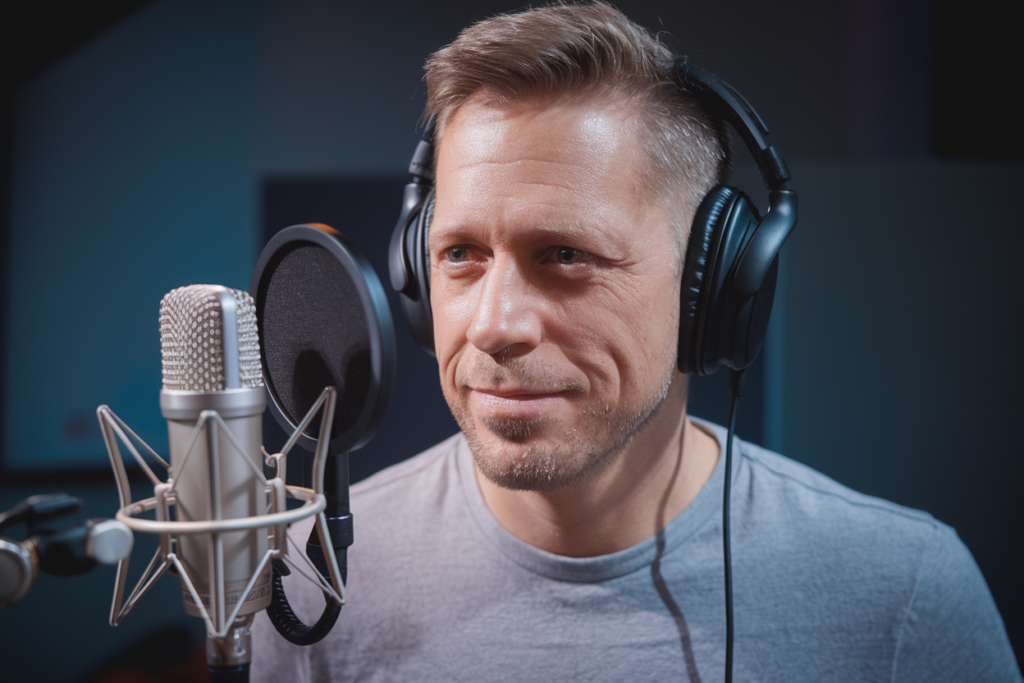Key Takeaways
- Role of the Director: Effective directing involves guiding voice actors to deliver authentic performances that align with the project’s creative vision.
- Essential Skills: Key skills for successful direction include strong communication, empathy, creativity, patience, and cultural awareness to enhance actor performances.
- Language Nuances: Understanding distinct German dialects and accents is crucial for eliciting accurate emotional tones from voice actors.
- Cultural Context: Familiarity with cultural expressions and humor helps ensure characters resonate authentically with a German audience.
- Building Rapport: Establishing trust and open communication fosters a collaborative environment where voice actors feel comfortable exploring their roles.
- Constructive Feedback: Providing clear, specific feedback while balancing encouragement boosts actor confidence and leads to compelling performances.
Ever wondered what it takes to direct German voice actors effectively? The world of voice acting is rich and diverse, but directing in a language as nuanced as German can be a unique challenge. Whether you’re working on an animated film, video game, or commercial, understanding the intricacies of the language and culture is crucial for bringing characters to life.
Directing isn’t just about managing talent; it’s about creating an environment where authenticity flourishes. You’ll need to navigate accents, dialects, and emotional nuances that can make or break your project. So how do you ensure your direction resonates with both the actors and your audience? Let’s dive into some essential tips that will elevate your directing skills and help you connect with German voice talents like never before.
Understanding The Role Of A Director
Directing voice actors involves guiding them to deliver authentic performances that resonate with audiences. It’s about more than just managing the recording; it’s about shaping the character and story.
Importance Of Voice Direction
Voice direction plays a crucial role in ensuring that your project meets its creative vision. You’ll need to communicate clearly with voice talent, providing constructive feedback while fostering a comfortable environment for them to express themselves. Effective direction can elevate the performance, making characters more relatable and engaging. Think about how a small adjustment in tone or delivery can drastically change the audience’s perception of a scene.
Skills Required For Directing Voice Actors
To successfully direct voice actors, you should possess several key skills:
- Communication: Clearly articulating your vision helps voice artists understand their roles better.
- Empathy: Understanding each actor’s strengths allows you to tailor direction effectively.
- Creativity: Bringing fresh ideas enhances character development and storytelling.
- Patience: Working through multiple takes requires maintaining a calm demeanor and encouraging perseverance.
- Cultural Awareness: Familiarity with dialects and emotional nuances ensures authenticity in performances.
These skills combine to create an effective directing style that resonates with both the performers and the audience. By honing these abilities, you foster stronger connections with your voice talent, resulting in richer performances that stand out in any medium.
Challenges In Directing German Voice Actors
Directing German voice actors presents unique challenges that require careful navigation. Understanding the language and cultural context is essential for eliciting authentic performances.
Language Nuances
German features distinct dialects and accents, which can impact a voice actor’s delivery. You might encounter variations like Hochdeutsch (Standard German) or regional dialects such as Bavarian or Swabian. Each variation carries its own nuances, affecting pronunciation and emotional tone. To ensure your project resonates with audiences, you need to guide voice talents in adapting their performance based on these linguistic subtleties. Providing clear direction helps capture the intended emotion while respecting the character’s background.
Cultural Considerations
Cultural context plays a significant role in directing voice talent effectively. You’ll find that humor, gestures, and emotional expressions differ across cultures. As a director, understanding these elements ensures that your characters come off as relatable to a German audience. Engaging with your actors about cultural touchpoints fosters an environment where they feel comfortable exploring their characters’ depths. Also, addressing common stereotypes can help avoid pitfalls that may alienate listeners or diminish the authenticity of your project.
By focusing on these aspects—language nuances and cultural considerations—you enhance the overall quality of voiceovers, creating memorable experiences for audiences while optimizing collaboration with German voice artists.
Techniques For Effective Direction
Directing German voice actors requires a blend of skill and sensitivity. Understanding how to create an engaging environment enhances the performance of every voice artist involved.
Building Rapport With Actors
Building rapport with your voice talent is essential. Trust fosters creativity, encouraging actors to explore their characters fully. Start by engaging in casual conversation before recording sessions; this helps break the ice. Show genuine interest in their interpretation of the role, allowing them to express thoughts openly. When actors feel valued, they’re more likely to deliver authentic performances that resonate.
Utilize positive reinforcement during sessions. Compliment strong choices and encourage exploration of different delivery styles. This approach not only boosts confidence but also cultivates a collaborative atmosphere where ideas flow freely.
Providing Constructive Feedback
Providing constructive feedback significantly impacts the final product. Focus on clarity when communicating your vision for a character’s emotions or tone. Use specific examples from previous takes, pointing out what worked well and what needs adjustments.
Balance criticism with encouragement; highlight strengths while addressing areas for improvement. Instead of saying “that’s wrong,” try suggesting alternatives like “let’s explore a softer approach.” This method promotes growth and makes it easier for voice actors to adapt their performances.
Encourage open dialogue during sessions; invite questions about direction or character motivations. An actor who understands your vision can better align their performance with your expectations, resulting in compelling voiceovers that captivate audiences.
By mastering these techniques, you create an effective directing style that resonates with both performers and audiences alike.
Examples Of Successful Directing Approaches
Successful directing approaches in German voice acting create a strong foundation for authentic performances. By employing effective strategies, you can enhance the quality of voiceovers and ensure that your projects resonate with audiences.
Case Studies In German Voice Acting
Several case studies illustrate the impact of tailored directing styles on voiceover talent. For instance, in a popular animated series, directors emphasized character backstory. This focus enabled voice actors to connect emotionally with their roles. The result? A deeper portrayal that captivated viewers.
Another example comes from video game development, where directors collaborated closely with voice artists during recording sessions. By allowing actors to improvise within their characters’ contexts, they generated spontaneous moments that enhanced the overall gaming experience. These instances highlight the importance of adapting directing techniques to suit specific projects while ensuring clarity and emotional depth.
Interviews With Experienced Directors
Interviews with experienced directors reveal common themes in successful directing methods for German voice actors. Many emphasize the significance of cultural understanding as a key factor in achieving authentic performances. They often mention how familiarity with regional dialects helps them guide performers effectively.
Directors also stress the value of open communication during sessions. They encourage feedback loops where both parties feel comfortable sharing ideas and suggestions. This collaborative atmosphere fosters creativity among voice artists and leads to richer interpretations of characters.
Moreover, seasoned directors recommend starting each session with casual conversations to build rapport before diving into recordings. This approach not only eases nerves but also sets a positive tone for creativity—essential for delivering compelling voiceovers that truly engage audiences.
By integrating these successful approaches into your directing style, you can maximize your collaboration with German voice talent and elevate the overall quality of your projects.
Conclusion
Directing German voice actors is an art that requires a blend of cultural understanding and effective communication. By fostering a supportive environment where trust thrives, you can unlock your actors’ full potential. Emphasizing empathy and creativity will not only enhance performances but also lead to more authentic character portrayals.
Utilizing the techniques discussed, you’ll create memorable experiences for both your audience and the voice talent. Remember that every session is an opportunity to build rapport and inspire creativity. With patience and dedication, you’ll elevate the quality of your projects while forging strong connections with German voice artists, ensuring your work resonates deeply across cultures.
Frequently Asked Questions
What are the main challenges of directing German voice actors?
Directing German voice actors involves understanding language nuances, cultural context, and regional accents. Challenges include navigating dialects like Hochdeutsch and ensuring emotional authenticity while respecting character backgrounds. Clear communication and cultural awareness are essential for overcoming these hurdles.
Why is cultural awareness important in voice direction?
Cultural awareness helps directors create relatable characters that resonate with audiences. Understanding humor, gestures, and emotional expressions across cultures allows directors to guide voice actors effectively, leading to authentic performances that enhance the overall quality of the project.
How can directors build rapport with voice actors?
Building rapport can be achieved by engaging in casual conversation before recording sessions and showing genuine interest in each actor’s interpretation of their character. Trust fosters creativity, making it easier for actors to explore their roles fully.
What techniques enhance effective voice direction?
Key techniques include positive reinforcement, constructive feedback, clear communication, and a balance between encouragement and criticism. Creating a comfortable environment encourages collaboration, allowing directors to draw out compelling performances from voice talent.
Can you provide examples of successful directing approaches?
Successful directing approaches often involve emphasizing character backstories or allowing improvisation in performance. Case studies show how tailored directing styles lead to deeper portrayals and enhanced audience experiences in projects like animated series or video games.
What skills are essential for directors working with German voice talent?
Essential skills include communication, empathy, creativity, patience, and cultural awareness. These abilities help directors foster a collaborative atmosphere that resonates with both performers and audiences while enhancing the quality of voiceovers produced.







